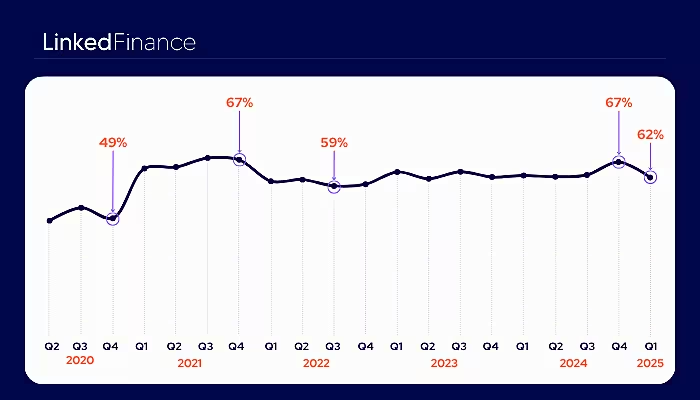A record high in optimism levels seen amongst Irish small and medium sized businesses (SMEs) several months ago has dropped back to more average levels as the turmoil of high US tariff announcements – and subsequent pauses – drives more uncertainty.
That is according to a new business confidence survey by Linked Finance.
Business optimism amongst all SMEs was 67 per cent at the end of Q4 2024, but this has dropped back to a more average 62 per cent, for Q1 2025.
While there has been no “cliff edge” fall in business activities, they remain in slightly negative territory year-on-year. SMEs surveyed for the sentiment tracker reported a drop in business of -5 per cent at end of Q1 2025, compared to a dip of -3 per cent for the same period in 2024.
Business activity and outlook
There was a significant upward spike in activities by exporters last quarter, likely due to a surge in orders to fill warehouses ahead of signalled changes to trade and new tariffs – announced by US president Donald Trump on April 2nd last.
The survey shows that 36 per cent of exporting SMEs saw higher business activity in the first quarter of this year, compared to 25 per cent of SMEs focused on the indigenous sector.
Concerns around a potential trade war are higher among the larger Irish SMEs surveyed, business based outside Dublin, and those in the retail/wholesale sector. One-in-four are very concerned about the issue, post the initial announcement of trade tariffs in the US.

In terms of SMEs’ expectations for business activity in Q2 2025, there has been a major swing in that of exporters, with 34 per cent more reporting an expected drop in business, year-on-year. This may however be related to the fact that so much export activity was frontloaded in Q1 of this year.
More positively, micro-businesses (which have 1-3 employees) have posted their lowest level of concern since Covid shuttered doors in 2020, with almost seven in 10 confident of the same, or a higher level, of business activity this quarter.
While employment levels remain strong, businesses based in Dublin are driving jobs growth, while those based outside the capital are in neutral territory.
Geopolitical turbulence
Linked Finance chief executive Niall O’Grady said that geopolitical turbulence has caused a rapid return to long-term average levels of business confidence, with an uncertain outlook in the medium term.
“While there has been a dip in optimism, and that gap between businesses in the capital and outside the capital continues to exist, Irish SMEs have shown resilience in the past – given the many challenges to trade in recent years – including Brexit and Covid. Micro-businesses only saw a small decline in optimism, and price rises are pulling back, which is good for customers.

Linked Finance chief executive Niall O’Grady.
“Given the turbulence and uncertainty experienced since the start of the year, I am not surprised by some of these results; but overall, Irish SMEs are weathering the challenges well. They are understandably concerned about the macro environment, but they are sourcing new markets – which is something many SMEs have been adept at – and may focus on more in the long term.”
The quarterly Business Confidence survey is conducted by Ipsos B&A on behalf of Linked Finance, which is Ireland’s leading SME peer-to-peer lender. In operation since 2013, Linked Finance recently passed the lending milestone of €350 million, and has just raised €50 million in wholesale funding that is now available to its SME borrowers.
Prices and profits
Year-on-year comparisons show price rises finally declining, with more than half of SMEs maintaining their prices year-on-year. Micro-businesses reported that they are less likely to increase prices, compared to last year.
Those SMEs that are currently implementing price increases are located throughout the country, whereas 12 months ago, the firms that were increasing prices were mainly Dublin-based.
Profitability remains a key pressure point for SME businesses, with one-in-three reporting that operational profit is lower year-on-year, and it has yet to return to pre-Covid levels.
Businesses with between 4 and 9 employees are feeling the pinch most with regard to profitability, while businesses based in Dublin are doing better, with 4-in-10 having higher profits year-on-year.
Tariffs
Exporting SMEs were the most concerned about the US’s effort to increase tariffs significantly, with 87 per cent either very concerned, or somewhat concerned.
On average, 66 per cent of businesses are concerned about a global trade war, with 80 per cent of those with 10 or more employees reporting that they are concerned.
Employment levels
Medium and large SMEs (with 10-250 employees) are driving job creation, with 25 per cent of those surveyed reporting higher employee levels compared to Q1 2024. While employment levels generally remain positive overall, sectors such as retail and wholesale are down 5 per cent year-on-year in their employee numbers.
Business based in Dublin are driving job growth, while those based outside the capital remain neutral in the same period. Retaining current headcount is the general status, with no upward trend of note, in all sectors combined.











